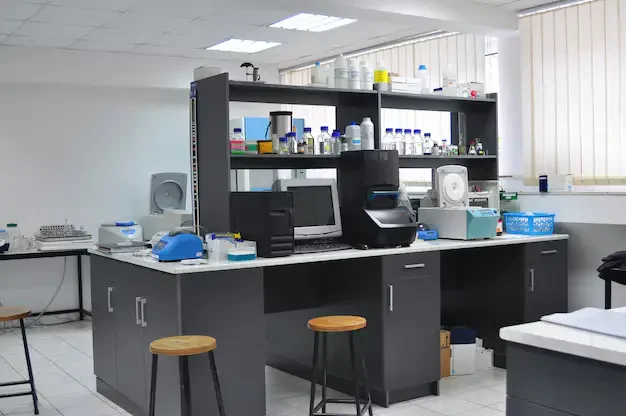When designing or choosing a lab bench, it’s not just about picking a table to work on—it’s about creating a foundation for accuracy, safety, and efficiency in your lab. Whether you’re outfitting a school lab, a commercial facility, or a personal workspace, the requirements for a lab bench must meet strict standards to ensure productivity and safety.
Key Features of an Ideal Lab Bench
Material Selection for Durability and Resistance
The first thing to consider for a laboratory bench is the material. A lab bench isn’t your run-of-the-mill furniture. It must withstand chemical spills, extreme temperatures, and physical wear and tear. Common choices include epoxy resin, phenolic resin, and stainless steel—each known for its durability and resistance to corrosion.
Imagine spilling sulfuric acid on a wooden table—it wouldn’t end well. Choosing the right material can mean the difference between a functional workspace and a costly replacement.
Ergonomic Design for Optimal Efficiency
Let’s face it, labs are busy places. Scientists, researchers, and students spend long hours working at benches. An ergonomic design ensures comfort and reduces fatigue. Adjustable heights, well-placed footrests, and rounded edges can make a world of difference.
Picture this: no more backaches or awkward crouching while working with delicate instruments. A well-designed lab bench supports you—literally—so you can focus on your experiments.
Weight-Bearing Capacity and Stability
From microscopes to centrifuges, lab equipment isn’t exactly lightweight. A lab bench must be stable enough to handle heavy loads without wobbling. Workbench specifications should include weight-bearing capacities to guide you. Look for reinforced frames and anti-slip feet to ensure stability.
Functional Considerations for Laboratory Benches
Storage Solutions and Accessibility
A clutter-free lab is a productive lab. Integrated drawers, shelves, and cabinets make it easy to store tools and chemicals while keeping the workspace tidy. Modular storage options can adapt to changing needs, ensuring everything is always within reach.
Think of it this way: Would you rather waste time hunting for a pipette or get straight to work knowing exactly where it is?
Customization Options for Specific Lab Needs
No two labs are the same, and neither are their requirements. Customizable lab benches allow you to tailor your workspace to specific tasks. Need a fume hood attachment? Extra outlets for your equipment? Customization ensures the bench fits your unique workflow.
Compatibility with Laboratory Equipment
The lab equipment layout is another critical factor. A bench should have proper cutouts, fixtures, or mounts to accommodate equipment like microscopes, burners, or water baths. Ensuring compatibility minimizes downtime and boosts efficiency.
Safety and Compliance Standards for Lab Benches
Chemical Resistance and Fire Safety
Safety is non-negotiable. Lab benches must resist harsh chemicals and meet fire safety standards. Materials like epoxy resin are not only chemical-resistant but also flame-retardant, making them ideal for high-risk environments.
Compliance with Laboratory Safety Guidelines
Regulatory compliance isn’t just a suggestion—it’s a requirement. Lab benches must adhere to safety standards set by organizations like OSHA or ISO. This includes proper ventilation, spill containment features, and rounded edges to prevent injuries.
Electrical and Plumbing Integration
Modern labs often require built-in plumbing or electrical outlets. Whether you’re using a water bath or an electronic analyzer, having these integrations directly in your bench saves time and reduces clutter.
Choosing the Right Lab Bench for Your Needs
Factors to Consider Before Purchasing
Before you invest in a lab bench, consider your needs. What’s the size of your lab? What equipment will you use? And don’t forget your budget! These factors will help you narrow down options and choose a bench that’s both functional and affordable.
Comparing Modular and Fixed Lab Benches
Not sure whether to go modular or fixed? Modular benches offer flexibility, allowing you to reconfigure your layout as needed. Fixed benches, on the other hand, provide unmatched stability. The right choice depends on your lab’s workflow and future plans.
Cost vs. Longevity: Finding the Best Value
While budget constraints are important, don’t skimp on quality. Investing in a high-quality lab bench may cost more upfront but will save you money in the long run. Think of it as an investment in your lab’s efficiency and safety.
Ready to Equip Your Lab? Contact Us for Expert Advice
Choosing the perfect lab bench can feel overwhelming, but you don’t have to do it alone. Whether you’re setting up a brand-new lab or upgrading your current space, we’re here to help. Our customizable lab benches are designed to meet your unique requirements, ensuring safety, durability, and functionality.
Contact us today to explore our range of laboratory furniture and get expert guidance on creating the perfect workspace. Let’s build your lab bench the right way—so you can focus on the discoveries that matter most!
FAQs
What is the typical lifespan of a lab bench?
A well-maintained lab bench made from durable materials can last 10–20 years, depending on usage and environmental conditions.
Can lab benches be relocated easily?
Modular lab benches are designed for easy relocation, while fixed benches are more permanent and harder to move.
What are the standard dimensions of a lab bench?
Standard lab benches are usually 30–36 inches high, 24–30 inches deep, and can vary in length based on the lab’s requirements.
Do lab benches require regular maintenance?
Yes, periodic cleaning, inspection for wear and tear, and ensuring chemical resistance coatings remain intact are essential for long-term use.
Are there eco-friendly options for lab benches?
Yes, some manufacturers offer lab benches made from sustainable materials, like recycled resin or certified wood, to minimize environmental impact.

